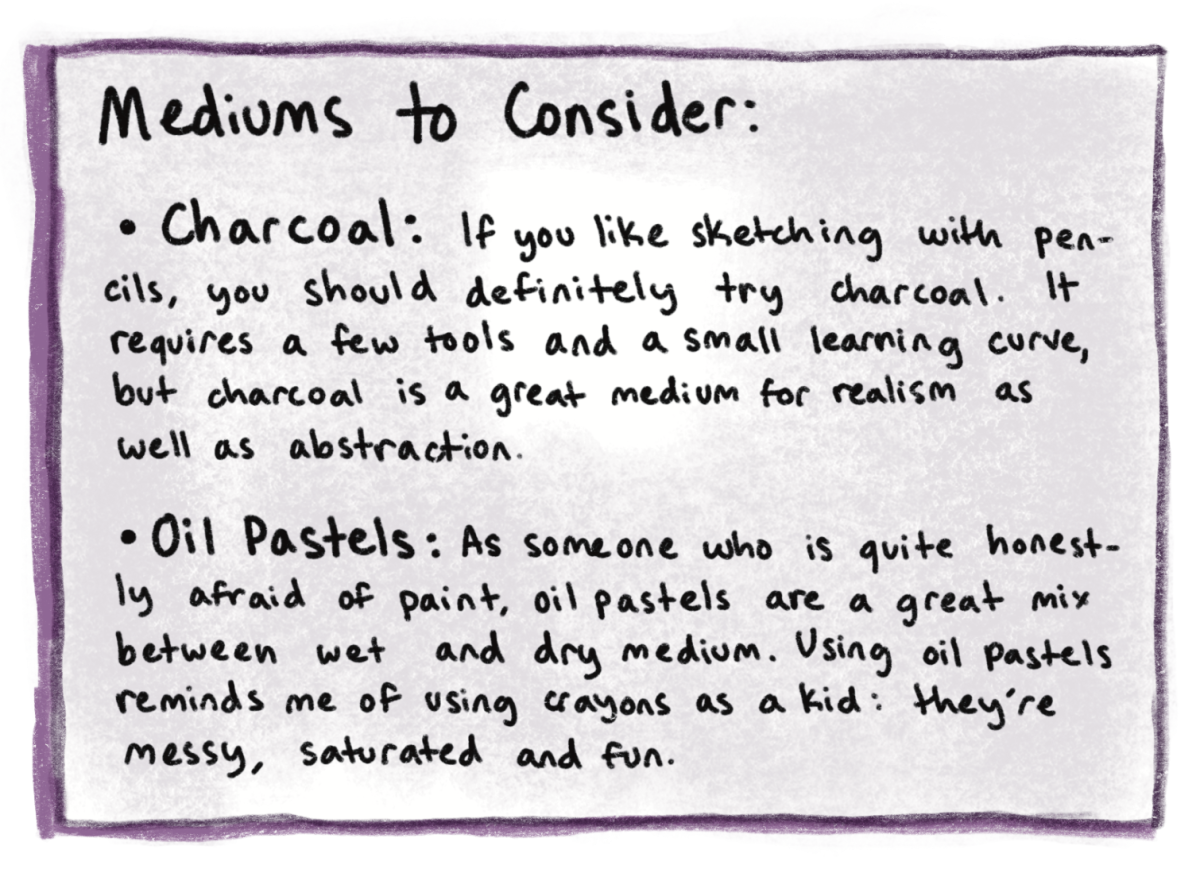What does the word burnout mean to you?
Lack of motivation. It means knowing that you have stuff on your plate, but not being able to tackle that plate.
Rate your stress level currently on a scale of 1 to 10.
20 million. The stress never goes away. You’re never completely done with your stuff.
How do you spend your day, start-to-finish?
When I get home, after extracurricular activities, I usually take a nap and then I eat dinner. And then I usually exercise a little bit and then start with college applications. I feel like I can afford to do homework during class. I can afford to put off homework because I know that college applications are more important for me. So I spend a couple hours doing college applications, and then with any time left over, I get to important stuff.
What time is it when you start your homework?
Usually around 1 or 2am.
What time do you wake up?
6:30am.
So how much free time do you think you get in a day?
It depends on how you define it. I mean, I do watch a lot of YouTube. So if that’s free time, then probably an hour or two. If free time means just doing nothing and like having nothing on your plate? Probably not at all. As soon as you get this item off your checklist, there’s something else. As soon as you get that done, there’s something else. It feels like you never get away from work. You never get a chance.
What feelings do you associate with burnout?
It’s just feeling like things will never get better. Things will never, like, just never be good. But I guess I try to stay away from those feelings. Try to concentrate on your short-term goals because that’s the only way you can get through this. Burnout is a cycle, and when you realize that you’re in this cycle, it’s hard to get motivated, because even if you worked really hard this one night, you’ll have to do it again and again.
How has burnout changed things for you, day-to-day?
Well, it certainly makes me less productive. I feel like I need to spend a lot more time taking care of myself, resting. And I can’t spend as much time as I used to on academic stuff, jobs, college apps, homework.
And emotionally, how do you think burnout’s affected you?
I mean, I guess it gives me kind of a grim outlook. Because I keep looking for a solution to this burnout and it doesn’t feel like it’s presenting itself. And that’s because it’s easy to get through one day but when you keep thinking, ‘oh my god, I have so much stuff next month. I have this, XYZ thing next month, I have to do college apps.’ It’s like there’s no end in sight.
Post-COVID, does your workload feel manageable?
No.
Why not?
It feels like it’s ever increasing and I can never cut it down. As soon as I finish one thing, another thing pops up, and it is a never ending cycle. Last year, I think the administration really let us have an easy year. With the first semester schedule, you could wake up at 10am on a Monday, and you’d be fine. It gave me a lot of time to really get my stuff together. I got my standardized tests done and wasn’t stressed about that at all. I got good grades in some of the hardest classes––and I was taking harder classes last year than this year. I was doing a lot better last year. [This year,] it feels like it’s harder to concentrate on everything. When you have a bunch of stuff, it’s hard to concentrate on every single thing, or really feel like you can chip away at that workload. In the back of your mind, you know that there’s stuff you need to do but it’s just so hard to concentrate, because whenever you get started on something, you start thinking, ‘oh my god, like maybe this is more important. I don’t have much time, I need to get stuff done.’
Why do you think that balancing work feels more difficult this year?
I think it’s really just about being back in school. There’s, like, you know, being back in school is good because you get the social experience. You get to talk to people you can tell you know, he wants to go there, but also it’s really draining. I think most of it is just mental. You have to put on a facade. You have to be alert. You’re not comfortable because it’s a lot easier to have school from the comfort of your bedroom than from a white classroom with white lights.
What is that facade you mentioned?
The facade it’s really just like, there is a cycle or like a peer pressure. There’s, like you have to maintain a certain face because that’s what people expect, [pretend] that you have everything under control. Most people expect you to be social because there’s a stigma that being an extrovert is better than being introverted.
And why do you think burnout is hitting everyone––not just you––so hard right now?
Probably going back to what we talked about––pandemic school to in-person school, everything’s crashing back and you have so much stuff on your plate you’d never really conceptualized. Seeing the seniors right now, it feels like most people haven’t really faced true burnout before this year. There just wasn’t as much stuff to do last year, but suddenly, everything’s going back, extracurriculars are in full swing [and] school is getting a lot tougher, because last year, we didn’t have to worry about finals, and this year, we have longer classes, more homework. A lot of it too is probably due to the lack of social interaction, because of the pandemic. Not to say that everyone was shut in their room all day, but there was a lot less school interaction. That’s a big part of how teenagers socialize. Suddenly, it feels like you have to try so much harder to be that person you used to be.
Describe your biggest burnout moment this year. How did it feel?
After early application deadlines for college, I felt really relieved because I’ve submitted applications to colleges, but then immediately after, like, I started thinking about, Oh, my God, I have XYZ application due in a month. And just the feeling of getting back into that cycle is not great. I remember just like spending hours sitting in front of a computer screen, falling asleep at some points, just [feeling] really burnt out because I did not for the life of me want to write another college essay. I was just like,’okay, well, I still have a little bit of time. I’ll just leave it to my future self, or no, because I want everything to go well.’ I think [my burnout] really started after I submitted my first applications because I felt so relieved and like, ‘oh my God, such a load has been lifted.’ But in reality, I’d just set it down for a minute. I have to pick it back up. College apps are probably the biggest source of burnout that anyone here faces because they’re something that no one wants to do, whereas extracurriculars or even the classes you take, that’s something that you do of your own free will.
It sounds like there’s like an incredible amount of pressure to get these things done. So where does that pressure come from?
I think it’s really all internal. Like the easy cop-out answer is this a society or parents but like, because we’ve learned from society and parents, we have this like internal pressure––not to be cliche––[but] to be our best selves. Having a high-achieving sister definitely plays into it. Internally, I know that if I don’t match the achievements of my sister, then people are gonna judge me even if it’s not explicitly.
Does it feel like you have these shoes of hers to fill, and how does that affect your burnout daily?
When I think about the numb moments, I just realize, ‘wow, I’m so unproductive. My sister probably was a lot better when she was my age.’ Just the comparisons.
And does that affect your relationships? Not just with your sister, but your parents, your friends, other people?
Friends and other people less so, because friends don’t have responsibilities to each other in terms of success… For parents, definitely. I mean, I obviously want my parents’ gratification. I want them to think well [of me], and if that doesn’t happen, or if they don’t outwardly say, ‘oh, my God, you’re doing such a good job!’ then it feels like I know in the back of my mind, they’re judging me. I come from an Asian household where comparisons are ubiquitous. I grew up thinking, ‘oh my God, I need to do so much work. I need to try my best and get into an Ivy League college. I need to earn a six figure salary, and make everyone proud.’ It’s become a part of my identity.
And none of those things are guaranteed, right? The Ivy League school, the salary and all of these things. But it’s like you said it’s become a part of your identity. How has it affected your burnout to balance the fact that something that’s become a part of your identity––something you’ve spent so long working for––may not necessarily work out?
In my mind, I feel bad when I think other people are doing really well. It makes me feel like I could be doing a lot better. I think background is just really hard to escape from, even if you’re not Asian, even if you don’t have high-achieving siblings or relatives. I think this is something that is inherently societal, right? We inherently glamorize those people who do well, the people who succeed in life. People view these people in such a positive light, like, ‘that’s the ideal citizen. That’s what everyone should be.’
We’ve talked about identity-related stress, but how has the stress culture at Ladue affected your stress levels and burnout?
We are a high achieving school––there’s a lot of people that go on and do great things, and that in and of itself is a stressor. I think the general idea of burnout is common to almost everyone.
Do you think teachers have been accommodating in terms of burnout?
My teacher gave me a small extension for one of my essays because I have a lot going on. But I don’t think so because for the most part, I think teachers are just plugging through their curriculums. It’s not their fault, because, first of all, like it’s been a year since we’ve had a real curriculum where they’re able to get through all of their content. It’s a lot to tackle your own curriculum and your students’ problems.
How sustainable is this lifestyle?
Not really sure. Probably not much longer. Another month? That’s really all I can think about. I can see past it, but I don’t really see this bright future ahead of it. I go to college and take hard classes, and then [worry about] GPA and again, this never ends. It’s really just like a long haul. It’s a constant grind. I was really excited to go back to school this year, because it’s some sense of normalcy, but it’s just very redundant. It’s not appealing anymore––it’s lost its novelty.
Long-term, how do you see things going for you?
I know, eventually, the source of my burnout will go away. Eventually, I won’t have college apps anymore. Eventually, school will be done. But it’s hard to think about the long-term because the reality is still here. I still have to concentrate on my stuff, because that’s what’s important in the short-run.
What emotions do you associate with burnout?
Dread. You’re dreading what comes next, dreading the next day, you’re dreading the deadline for your applications.
How long has it been since you haven’t felt that dread?
I’m not really sure.
Final question — What do you wish you could tell teachers or parents or friends or even admin? What do you people who are seeing you struggle with burnout knew?
It’s not laziness. It’s not. It’s not something that you’re trying to do. It’s not like people who are facing burnout just watch Netflix all day because they don’t want to do homework. Once you’ve become trapped in the cycle of burnout, it’s really hard for you to get out.







